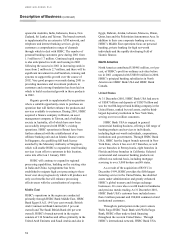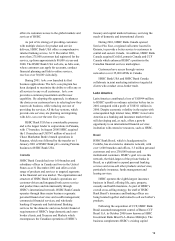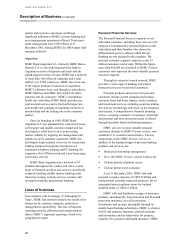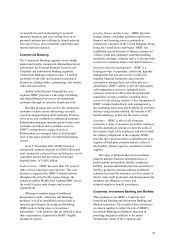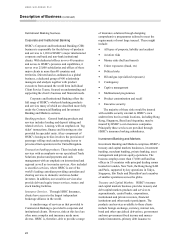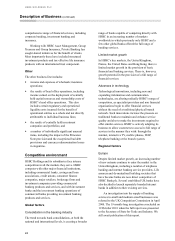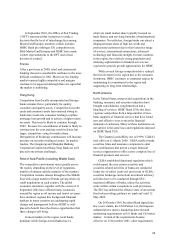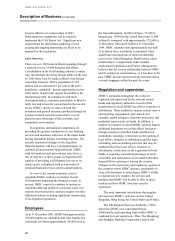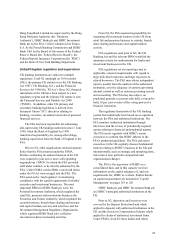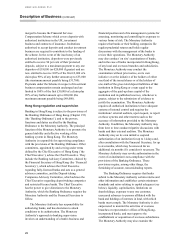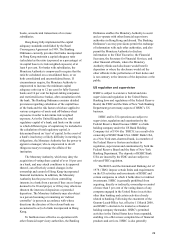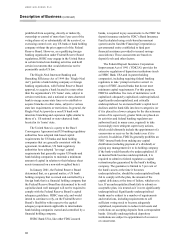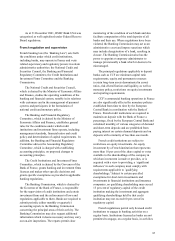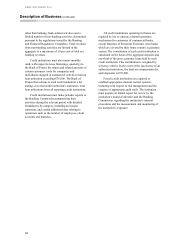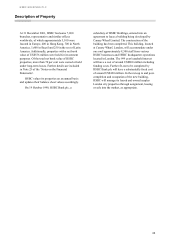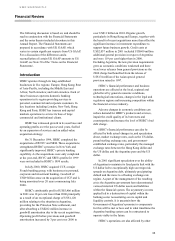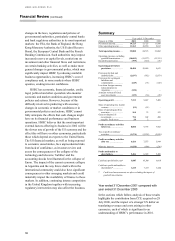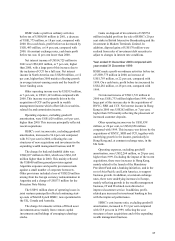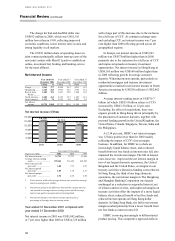HSBC 2001 Annual Report Download - page 30
Download and view the complete annual report
Please find page 30 of the 2001 HSBC annual report below. You can navigate through the pages in the report by either clicking on the pages listed below, or by using the keyword search tool below to find specific information within the annual report.
HSBC HOLDINGS PLC
Description of Business (continued)
28
merged to become the Financial Services
Compensation Scheme which covers deposits with
authorised institutions in the UK, investment
business and contracts of insurance. Institutions
authorised to accept deposits and conduct investment
business are required to contribute to the funding of
the scheme. In the event of the insolvency of an
authorised institution, depositors were previously
entitled to receive 90 per cent of their protected
deposits, subject to a maximum payment to any one
depositor of £18,000 (or €20,000 if greater) and are
now entitled to receive 100% of the first £2,000 of a
claim plus 90% of any further amount up to £33,000
(the maximum amount payable being £31,700).
Payments under the Scheme in respect of investment
business compensation remain unchanged and are
limited to 100% of the first £30,000 of a claim plus
90% of any further amount up to £20,000 (the
maximum amount payable being £48,000).
Hong Kong regulation and supervision
Banking in Hong Kong is subject to the provisions of
the Banking Ordinance of Hong Kong (Chapter 155)
(the ‘Banking Ordinance’ ), and to the powers,
functions and duties ascribed by the Banking
Ordinance to the Monetary Authority. The principal
function of the Monetary Authority is to promote the
general stability and effective working of the
banking system in Hong Kong. The Monetary
Authority is responsible for supervising compliance
with the provisions of the Banking Ordinance. Other
committees, appointed by and serving under terms
defined by the Chief Executive of Hong Kong (‘the
Chief Executive’ ), advise the Chief Executive. They
include the Banking Advisory Committee, chaired by
the Financial Secretary of Hong Kong (the ‘Financial
Secretary’ ), which advises the Chief Executive
regarding fully-licensed banks and acts as a general
advisory committee, and the Deposit-taking
Companies Advisory Committee, which advises the
Chief Executive regarding deposit-taking companies
and restricted-licence banks. The Chief Executive
has the power to give directions to the Monetary
Authority, which the Banking Ordinance requires the
Monetary Authority and the Financial Secretary to
follow.
The Monetary Authority has responsibility for
authorising banks, and has discretion to attach
conditions to its authorisation. The Monetary
Authority’s approach to banking supervision
involves an understanding of a bank's business and
financial position and of its management systems for
assessing, monitoring and controlling its exposure to
various forms of risk. The Monetary Authority
requires that banks or their holding companies file
regular prudential returns and holds regular
discussions with the management of the banks to
review their operations. The Monetary Authority
may also conduct ‘on site’ examinations of banks,
and in the case of banks incorporated in Hong Kong,
of any local and overseas branches and subsidiaries.
The Monetary Authority may conduct the
examination without prior notice, on its own
initiative or at the initiative of the holders of either
one-third of the issued shares or of the holders of
one-tenth of the gross total deposit liabilities of that
institution in Hong Kong or a sum equal to the
aggregate of the paid-up share capital of the
institution and its published reserves, whichever is
greater, subject to the submission of evidence to
justify the examination. The Monetary Authority
requires all authorised institutions to have adequate
systems of internal control and requires the
institutions’ external auditors, upon request, to report
on those systems and other matters such as the
accuracy of information provided to the Monetary
Authority. In addition, the Monetary Authority may
from time to time conduct tripartite discussions with
banks and their external auditors. The Monetary
Authority may on its own initiative suspend
authorisation of an institution for up to 14 days and,
after consultation with the Financial Secretary, for up
to six months, which may be renewed for an
additional six months if it considers it necessary. The
Monetary Authority may revoke authorisation in the
event of an institution's non-compliance with the
provisions of the Banking Ordinance. These
provisions require, among other things, the
furnishing of accurate, non-misleading reports.
The Banking Ordinance requires that banks
submit to the Monetary Authority certain returns and
other information and establishes certain minimum
standards and ratios relating to capital adequacy (see
below), liquidity, capitalisation, limitations on
shareholdings, exposure to any one customer,
unsecured advances to persons affiliated with the
bank and holdings of interests in land, with which
banks must comply. The Monetary Authority is also
empowered to monitor the activities of overseas
branches or representative offices of Hong Kong-
incorporated banks, and must approve the
establishment or acquisition of overseas subsidiaries.
The Monetary Authority may also examine the


